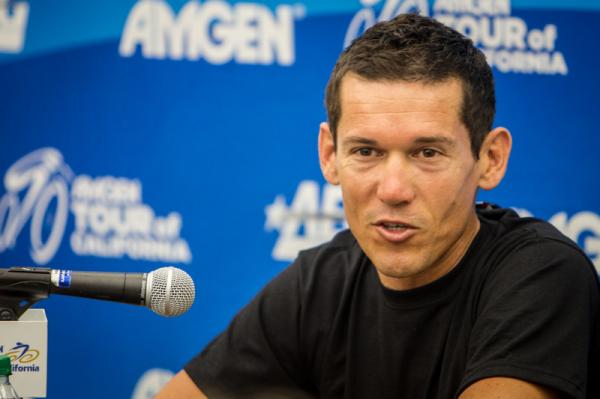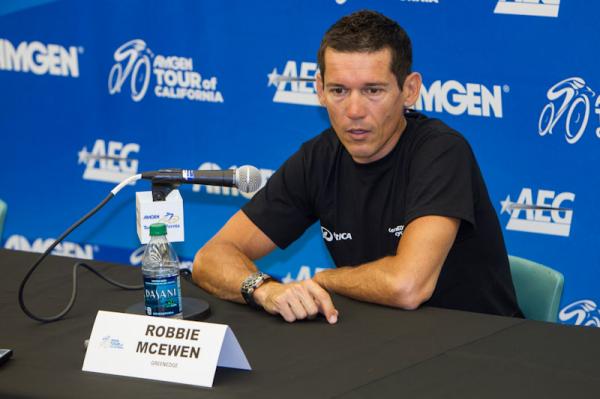Video: McEwen steps away from his racing career after 17 years
Australian accepts changed role as sprint coach



The peloton will bid adieu to one of its most colorful characters on Sunday as Robbie McEwen ends his racing career in the Amgen Tour of California and prepares to move directly into a position as sprint coach for his Orica-GreenEdge team.
McEwen began his career in 1996 with Rabobank, moved through to Domo-Farm Frites and Lotto and onto Katusha, Radioshack and finally Orica-GreenEdge in the latter part of his career.
Three times a winner of the Tour de France's green jersey, a winner of a dozen stages in each the Tour, the Giro d'Italia and the Tour Down Under, and a five time winner of Paris-Brussels, McEwen took his wins the hard way, as a scrappy, opportunistic sprinter who was as generous with his post-race analysis as he was with his elbows in the final 200 meters of a sprint.
During his peak, McEwen raced with the sort of panache that is no longer as common in the days of well-drilled lead-out trains, but ironically, he will now move into a role where he will be schooling his team on the perfect lead-out for the team's main sprinter, Matthew Goss.
"I like it when a win is unexpected, exciting, spectacular, seemingly impossible and you still get it done, rather than the 'line it up and just go so fast that nobody else is in the race pretty much'," he said.
Speaking at a press conference in Bakersfield on the day of the Tour of California time trial, McEwen looked back on his 17 seasons and shared his favorite moments and his impressions of how sprinting has developed at the highest level of the sport.
"I guess because I made my name, my career at the Tour de France, so my top moments pretty much come from there," he began, but then digressed to highlighting exactly what fans found so compelling about his character - his ability to win against the odds.
Get The Leadout Newsletter
The latest race content, interviews, features, reviews and expert buying guides, direct to your inbox!
"Apart from the wins, I think it's also the way you come through the tough moments in your career, when it's not going as well, or when you're coming back from a bad injury like I have a couple of times," McEwen said. "It's the way you come back from those things and get back up to a good level, and achieve again; they're not moments, as such, but sometimes rather lengthy episodes in your career, you've really got to fight through to find success again, and that's one of the most satisfying things."
McEwen has had his share of adversity: in 2004 he won the green jersey by racing the majority of the three week Tour, including both the Alpine and Pyrenean stages with two fractured vertebrae. In 2009, he hit a sign with his knee and fractured a bone below his knee and damaged the tendons around it. "Basically that ended my career, but I still found a way to ride. I fought through, rehabbed really hard, and had a couple of operations. I am not at the same level as before, but I still managed to win some races, and have a good time and go out on my terms."
McEwen named three moments from his Tour career as his favorites: "My first ever Tour de France stage win on the Champes Elysees in '99 because I'd been trying for so long. It was my third Tour, the last day and I finally cracked a win after having a crash earlier in the day on the way to Paris. To finally get it, and then to get it in such a special place, and that day I beat Erik Zabel who was wearing the green jersey, so it was such a prestigious win. That's always going to be a really fond memory.
"Three years later, again on the Champes Elysees, wearing the green jersey, winning the stage and wrapping up the competition - again that year Erik Zabel, he had been my nemesis and won green six years in a row and then I came and I won the competition, won the stage wearing the jersey on the Champs, and for a sprinter, I think that's the holy grail - it doesn't get much better than that one.
"Maybe the top moment, because there was so much emotion: there was anger, there was pride, there was a bit of everything, was in Canterbury in '07 when I crashed with 22km to go and my team waited for me, picked me up, rode an incredible team time trial back to the peloton, got me to about 5-6km to go, and I managed to find my way to the front.
"I'm not sure how, I popped through and everything started going back to plan with 1km to go. Until then it was an absolute shlamazel. I pulled myself back together and said, 'I'm back in the position I was supposed to be, now we go back to the plan we had as soon as I knew what that finish was gong to be like six months ago. To go and pull it off against the odds that day was a huge moment for me."
Although he never had a big, dominant lead-out train, McEwen was able to go up against that of T-Mobile and Erik Zabel, Fassa Bortolo for Alessandro Petacchi, but he described how lead-out trains became far more scientific during the HTC years with Cavendish, chalking up that difference to very scientific analysis of each rider's abilities, the courses and the competition to maximize the chance of success.
He said he looks forward to imparting that kind of information onto the young riders of the GreenEdge team.
Robbie McEwen describes how lead-out trains evolved
Robbie McEwen's post-retirement bucket list?
McEwen on why Cavendish is so fast